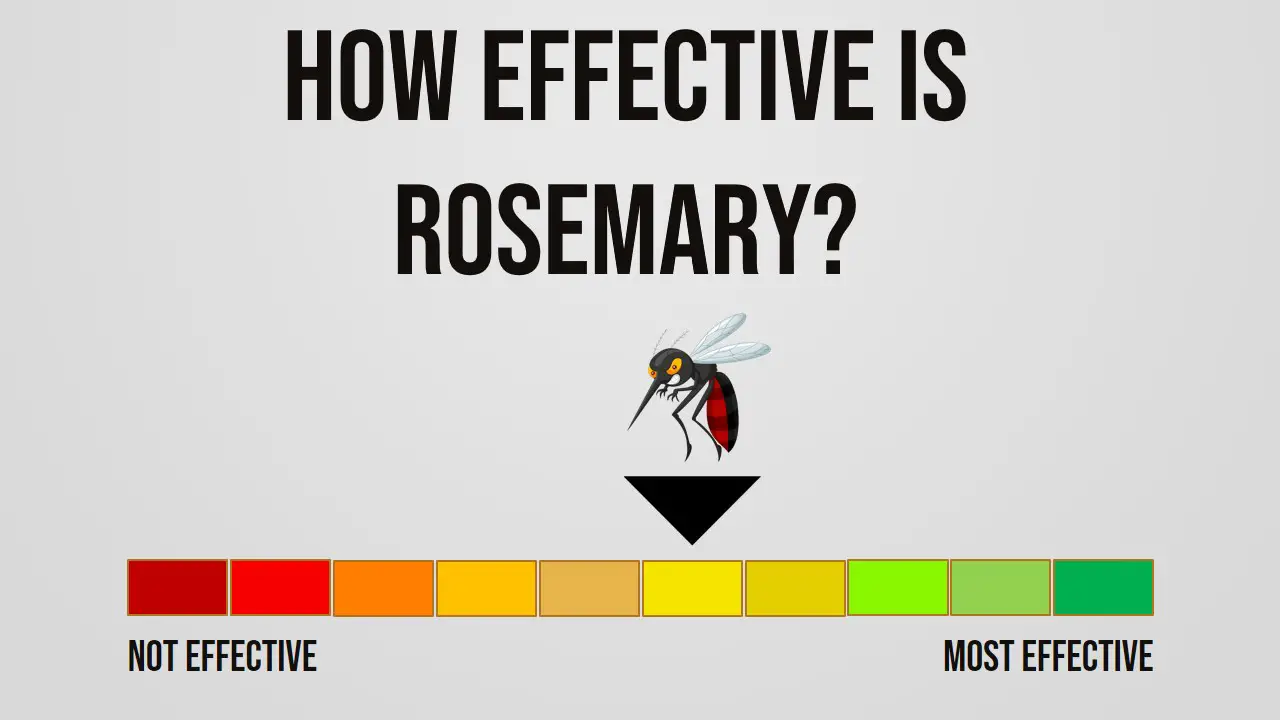The answer to this question depends on several factors. The main reason that rosemary oil is commonly associated with repelling mosquitoes is that it has been shown in some studies to be more effective than DEET, which is the most common active ingredient in bug sprays and insect repellents.
However, the results of these studies are mixed and more research is needed to confirm whether or not rosemary oil is truly more effective than DEET. Additionally, the concentration of rosemary oil that is necessary for mosquito repellency has not been determined.
For these reasons, it is best to use caution when using rosemary oil as a mosquito repellent and to follow the instructions on the product that you are using, rather than relying on rosemary oil alone to repel mosquitoes.
There are several other methods that people use in addition to rosemary oil to repel mosquitoes and keep their homes free of these pesky insects. One popular method is burning candles or incense made from natural ingredients like citronella or cloves, which have insect-repelling properties.
Additionally, simply wearing long sleeves and pants can help prevent bites from occurring if you are unable to avoid mosquito-infested areas.

Navigation
What Is Rosemary?
Rosemary is a herb that is commonly used in cooking. It has a strong, pungent flavor and a piney aroma. Rosemary is also known for its health benefits. It contains antioxidants that can protect cells from damage by free radicals and can help reduce inflammation in the body.
Because of these benefits, rosemary is often used as a natural remedy for various health problems, such as indigestion, muscle aches and pains, and respiratory ailments. Additionally, it can be used to promote healthy skin and hair.
You can buy rosemary essential oil, dried rosemary leaves, or fresh rosemary sprigs from your local grocery store or health food store. You can also grow your own rosemary plant.
To use rosemary for its health benefits, add a few drops of essential oil to a diffuser or create a rosemary-infused oil by adding fresh or dried rosemary to a carrier oil, such as jojoba oil or olive oil.
You can then use the oil in massage blends or to apply it to your skin as a natural treatment for certain health issues. There are many different ways to use rosemary, so explore the many benefits of this versatile herb.
Rosemary Oil Repellent
If you are interested in using rosemary oil as a mosquito repellent, there are a few things to keep in mind.
First, be sure to purchase rosemary oil that is 100% pure and not diluted with other oils or chemicals.
Second, follow the instructions on the product that you are using carefully, as using too much rosemary oil or applying it to areas of the skin that are not recommended could lead to irritation or other negative side effects.
Finally, keep in mind that there is a risk that mosquitoes will become resistant to rosemary oil over time. If your home becomes overrun with mosquitoes and using rosemary oil to repel them is not working, speak with your local public health department or pest control company for more advice on how to get rid of mosquitoes in your area.
Does The Rosemary Plant Deter Mosquitoes?
Rosmarinus officinalis, also known as rosemary or sage, is a fragrant plant that is often used in cooking. This herb has many potential benefits, and some people believe it can ward off mosquitoes. In this article, we explore whether rosemary plants deter mosquitoes, including the possible health risks associated with this plant.
Although rosemary plants have many potential benefits, there is not a lot of evidence to suggest that they deter mosquitoes. There are some anecdotal reports from people who claim that this plant has kept the insects away from them and their homes. However, most studies on rosemary and mosquito repellents have explored other essential oils or ingredients, such as citronella, rather than the plant itself.
There are a few potential reasons why rosemary plants might work as mosquito repellents. First, the plant contains compounds that are known to be toxic to mosquitoes, including camphor and eucalyptol. Additionally, rosemary plants emit a strong fragrance, which could mask the smells that attract mosquitoes.
Despite the lack of evidence, some people still believe that rosemary plants can deter mosquitoes. If you decide to try this plant as a mosquito repellent, it is important to be aware of the potential risks. First, camphor and eucalyptol are both toxic if ingested in large quantities.
It is also important to be aware that some people may be allergic to rosemary. If you experience any adverse reactions after using this plant, discontinue use immediately and consult a healthcare professional.
Overall, there is not enough evidence to suggest that rosemary plants are effective mosquito repellents. However, the plant does contain compounds that are toxic to mosquitoes
Do Sage And Rosemary Keep Mosquitoes Away
Yes, sage and rosemary are both known to be effective natural repellents against mosquitoes. The volatile oils present in these herbs have insecticidal properties that make them ideal for use as home remedies for keeping mosquitoes away.
In addition, the strong scent of these herbs is also believed to mask the odor produced by carbon dioxide on your skin, which attracts mosquitoes. Some other natural ingredients that are effective in repelling mosquitoes include citronella, lemon balm, cinnamon and lemongrass. You can try combining these herbs with each other or using them individually to get rid of the annoying insects in your backyard.
Additionally, you can also place containers filled with water near entrances to your home in order to prevent mosquitoes from breeding around your property.
How to Burn Rosemary for Mosquitoes
If you want to know how to burn rosemary for mosquitoes, your best bet is to use a smudge stick. A smudge stick consists of dried and bundled-up herbs, such as rosemary, sage, and other herbs that have mosquito repelling properties. Choose a bundle that’s made from fresh herbs when possible – the oils in the fresh herbs will be more potent and effective in repelling mosquitoes.
To use a smudge stick, first, lite it on fire and then blow it out so that it’s smoking. Wave the smudge stick around the perimeter of the room or outdoor area that you want to protect from mosquitoes. The smoke will help to keep the mosquitoes away. You can also add a few drops of mosquito-repelling essential oil to the smudge stick before you light it if you want an extra boost of protection.
There are other ways to burn herbs for mosquitoes as well. For example, you can use a diffuser or vaporizer to release the oils from the fresh or dried herbs into the air. You can also use an herbal burner or incense sticks if you want to burn the herbs directly.
If you choose to do this in your home instead of outdoors, just be sure to keep the windows and doors in your home closed so that the smell doesn’t get too strong.
Whichever method you use to burn rosemary for mosquitoes, just be sure to do so safely. Always use caution when burning herbs or any other materials, and make sure that there is no fire hazard where you’re burning the herbs. With a little bit of care, you can enjoy the mosquito-free benefits of burning rosemary without any worries.
Rosemary Mosquito Repellent Oil
Rosemary mosquito oil can be made at home with just a few simple ingredients. All you need is some rosemary leaves, a carrier oil like olive oil or coconut oil, and some essential oils. You can find the recipe online or in many books on natural health remedies.
To use, apply the oil to your skin before going outdoors. Reapply as needed, especially if you are sweating or swimming. You can also use it to repel mosquitos inside your home by diffusing a few drops in an essential oil diffuser.
Rosemary mosquito oil is effective at repelling mosquitos and other insects. It is also safe to use around children and pets. However, if you have sensitive skin, you may want to test the oil on a small area first before applying it over your entire body.
If you are interested in trying out rosemary mosquito oil for yourself, be sure to do some research on the best types and brands of ingredients to use. There are many different variations of this recipe that you can try, so take the time to find one that works best for your needs. Happy repelling!
Rosemary Mosquito Spray
This natural mosquito repellent is made with rosemary essential oil, which has insect-repellent properties. It’s easy to make and can be used on both skin and clothing.
Ingredients:
- 1/2 cup water
- 1/2 cup witch hazel or vodka
- 10 drops rosemary essential oil
Instructions:
1. Combine all ingredients in a small spray bottle.
2. Shake well before each use.
3. Apply to exposed skin or clothing as needed.
Notes:
1. This spray can also be used to repel other pests, such as ticks, gnats, and blackflies.
2. You can experiment with adding other essential oils to this recipe for extra protection against mosquitoes. Some good options include lavender oil, tea tree oil, or citronella oil.
3. This spray will last for several months when stored in a cool, dark place.
How to Grow Rosemary Indoors
Rosemary is a great herb to grow indoors. It’s one of the easiest herbs to grow, and it has some wonderful medicinal properties as well. If you want to learn how to grow rosemary indoors, then this guide is for you!
The first step in growing rosemary indoors is choosing the right pot. Rosemary doesn’t need a large pot, but it does need one that has good drainage. A clay pot with drainage holes in the bottom is ideal.
Fill the pot with a high-quality potting mix that is rich in organic matter. You can also add some perlite or sand to the mix to improve drainage. Then, place the rosemary plant in the pot and add more soil around it.
The next step is to water your rosemary plant regularly. Since you’re growing it indoors, you should set a timer for one or two times per week to remind yourself when to water. Be sure not to overwater your plant, as this can lead to root rot.
Finally, place your rosemary plant in a spot that gets lots of sunlight. A south-facing window is ideal. If you don’t have a south-facing window, you can use grow lights to give your plant the light it needs.
Now that you know how to grow rosemary indoors, it’s time to start enjoying all the benefits this amazing herb has to offer!


